Over 30 years of anarchist writing from Ireland listed under hundreds of topics
International
Spanish revolution on the streets of Cork...Again!
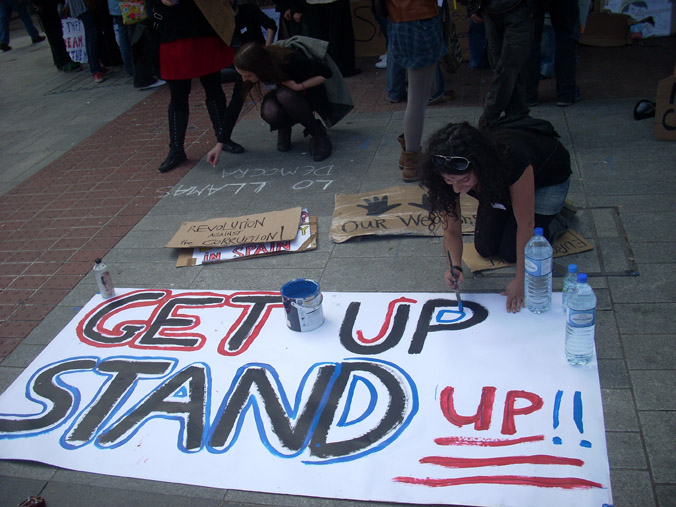
Following on from Saturday's Spanish Revolution solidarity protest in Cork City there was another big crowd on the street of the city Sunday. As the issues that have brought the people of Spain out to protest are just like those affecting people in Ireland and across Europe, there was many calls to make this movement international.
The solidarity group here plan to return to the Grand Parade every day this week to hand out information and discuss the events in Spain with passersby. This will be between 11am and 1pm, and from 6pm to 8pm. Come along and find out what's going on!
OBAMA - change you can’t believe in
 The election of Barack Obama to the White House in 2008 was one of the most celebrated electoral victories of recent times. Not since Nelson Mandela’s win in South Africa, following the collapse of the Apartheid regime, was the supposed power of the ballot box so publicly celebrated and displayed.
The election of Barack Obama to the White House in 2008 was one of the most celebrated electoral victories of recent times. Not since Nelson Mandela’s win in South Africa, following the collapse of the Apartheid regime, was the supposed power of the ballot box so publicly celebrated and displayed.
Obama’s victory was hailed as a triumph for the ‘democratic process’ and was widely touted as a fine example of how people power and electioneering can trump entrenched bigotry and money.
Obama + Internet + Money = HOPE
 The electoral system in the United States is notoriously conservative. Two political parties, the Republicans and the Democrats, dominate. To be a Presidential hopeful, you need to have stacks of money – to pay for advertising and campaign teams and so on and so forth. Usually this means courting big business and corporate interests in return for campaign donations.
The electoral system in the United States is notoriously conservative. Two political parties, the Republicans and the Democrats, dominate. To be a Presidential hopeful, you need to have stacks of money – to pay for advertising and campaign teams and so on and so forth. Usually this means courting big business and corporate interests in return for campaign donations.
As a former senator Obama was well aware of this situation and how things worked. Ultimately, however, his success lay in the fact that he mobilised in two distinct constituencies - among the business community but also amongst the grassroots voters. This latter aspect – his grassroots mobilisation - received considerable prominence because it was ‘news’ and noteworthy. His clear and unambiguous business friendly comments received less attention, but were nonetheless important.
A promise broken: Obama & Guantánamo Bay
 The Guantánamo Bay detention facility was created under George Bush’s Presidency in the aftermath of the attack on the World Trade Centre in New York in 2001. Described as ‘a place where normal legal rules’ do not apply, it quickly became infamous for harsh and extreme conditions of detention. Interrogators practiced a variety of torture techniques on prisoners at the facility including the now well known water-boarding procedure.
The Guantánamo Bay detention facility was created under George Bush’s Presidency in the aftermath of the attack on the World Trade Centre in New York in 2001. Described as ‘a place where normal legal rules’ do not apply, it quickly became infamous for harsh and extreme conditions of detention. Interrogators practiced a variety of torture techniques on prisoners at the facility including the now well known water-boarding procedure.
BACK to the FUTURE: Imagining the Future in a post-revolutionary world
 Editors’ Note:
Editors’ Note:
Much of our time as revolutionaries is spent on the routine of organising in the here and now – building a campaign, organising for a demonstration, planning for a trade union meeting…. Too often we don’t manage to take time to step back from the here and now and imagine or envisage what it’s all about. But without dreaming, without imagining a future the daily humdrum can seem dispiriting.
Peripherals Revolt: Spanish Square Occupation Movement Challenges Austerity and Worthless Elections
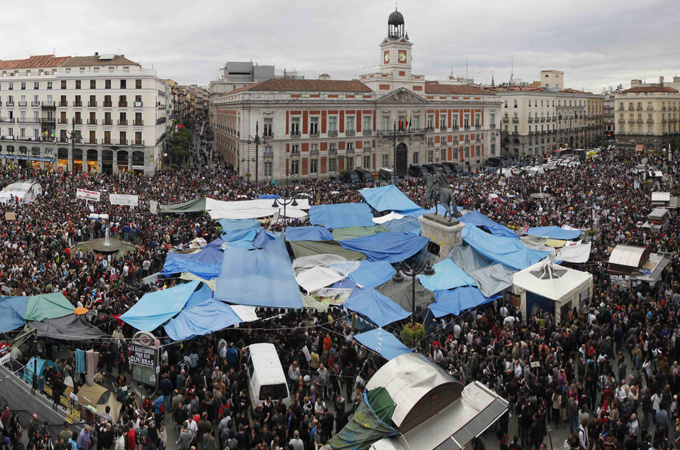 Since the demonstrations called last Sunday, the central squares of cities all across Spain have been occupied by camps of protestors, furious at austerity and the uselessness of all the existing politicians and the pointlessness of this coming Sunday's local elections.
Since the demonstrations called last Sunday, the central squares of cities all across Spain have been occupied by camps of protestors, furious at austerity and the uselessness of all the existing politicians and the pointlessness of this coming Sunday's local elections.
The movement consists mainly of young people, both students and unemployed or precarious young workers calling themselves by names such as Juventud Sin Futuro (Youth Without Future) and #DemocraciaRealYa (Real Democracy Now!). Bypassing existing organisations, whether political parties or trade unions, the participants have organised themselves via Facebook and Twitter, in the manner of the Tunisian and Egyptian activists of the Arab Spring.
VIDEOCRACY: Broadcasting Control over the Italian Psyche - review
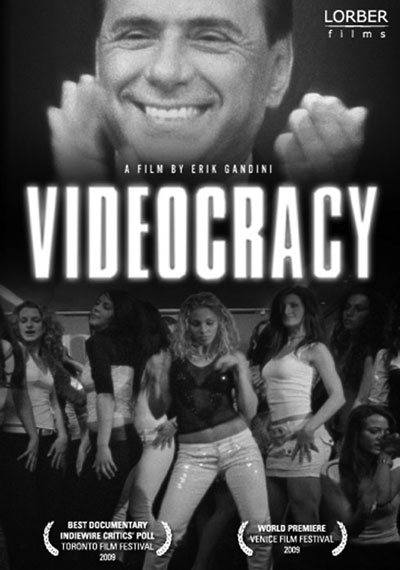 Erik Gandini’s “Videocracy” is an intriguing and distressing documentary film that explores Silvio Berlusconi’s media empire, and the deep impact that it has had on Italian society and culture. Gandini’s investigative endeavour was released in 2009, but the trailers were blocked on the six main Italian television channels, which are controlled by Berlusconi. It was a tacit form of censorship aimed at obstructing Videocracy’s popularity, the alleged reason for doing so being that it was offensive to Berlusconi’s reputation. This backfired completely as the block created mass-hype about the film, and when it was screened at the Venice Film Festival it was received by a huge audience and accolades.
Erik Gandini’s “Videocracy” is an intriguing and distressing documentary film that explores Silvio Berlusconi’s media empire, and the deep impact that it has had on Italian society and culture. Gandini’s investigative endeavour was released in 2009, but the trailers were blocked on the six main Italian television channels, which are controlled by Berlusconi. It was a tacit form of censorship aimed at obstructing Videocracy’s popularity, the alleged reason for doing so being that it was offensive to Berlusconi’s reputation. This backfired completely as the block created mass-hype about the film, and when it was screened at the Venice Film Festival it was received by a huge audience and accolades.
Review: The Kronstadt Rebellion, Still Significant 90 Years on
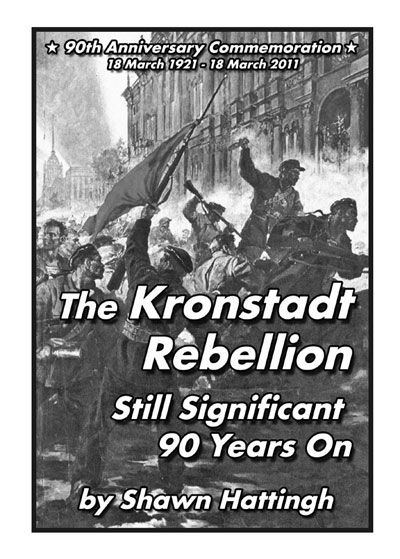 Zabalaza Books, the anarchist printing project linked to the Zabalaza Anarchist Communist Front (ZACF) in South Africa, recently produced this pamphlet to commemorate the Kronstadt uprising in March 1921, when the sailors and workers of the Kronstadt naval base rose up against the Bolsheviks and were slaughtered by the dictatorship.
Zabalaza Books, the anarchist printing project linked to the Zabalaza Anarchist Communist Front (ZACF) in South Africa, recently produced this pamphlet to commemorate the Kronstadt uprising in March 1921, when the sailors and workers of the Kronstadt naval base rose up against the Bolsheviks and were slaughtered by the dictatorship.
Soccer versus the state
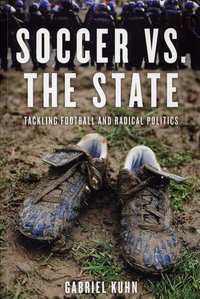
The following is an interview recorded with PM Press's Gabriel Kuhn about the subject of his recently published book of the same title, that he will be talking about at the Dublin Anarchist Bookfair on Saturday 14th May, at Liberty Hall at 14:00. The interview was conducted by WSM member and avid Bohs fan, Ciaran M.
“The revolution will inevitably awaken in the British working class the deepest passions which have been diverted along artificial channels with the aid of football." Leon Trotsky.
1) Football comes in for much negative criticism from the left, mainly criticisms similar to Trotsky’s above, deriding it as cathartic and a distraction. Yet in recent years, we’ve seen iconic events like the “Football Revolution” in Iran, the Greek riots following the death of Alexandros Grigoropoulos, where Panathanaikos fans fought against the police side by side with Anarchists and the Al-Ahly Ultras in Egypt and their apparent hand in revolution there. How influential has football been in Rebellions and amongst the rebellious throughout history?
Football has been attracting the masses around the world for over a century. Where masses gather, the powerful lose control – unless we're talking about orchestrated mass gatherings, which are characteristic of fascist and authoritarian regimes. But this doesn't really work with football, since it is hard to orchestrate a football game. Football is too unpredictable.
Workers Solidarity 121
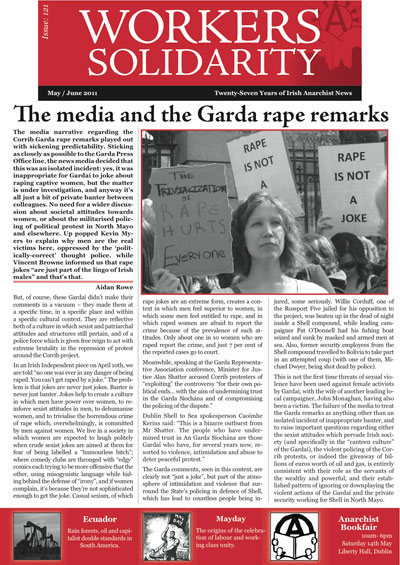
May - June 2011 Edition of the Workers Solidarity freesheet.
PDF of Workers Solidarity 121 Web Edition 3.73 Mb
Thinking About Anarchism: The State
Ecuador: Oil, Rainforests & the challenge of climate change
Review: Springtime, the New Student Rebellions
A Day out of the Ordinary! The Dublin Anarchist Bookfair 2011
Review: Democratic Left: The Life and Death of a Political Party
The media and the Garda rape remarks
PDF of Workers Solidarity 121 Web Edition 3.73 Mb

